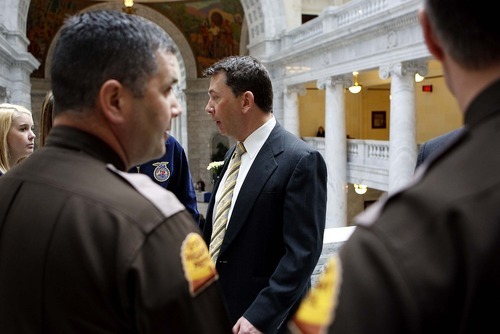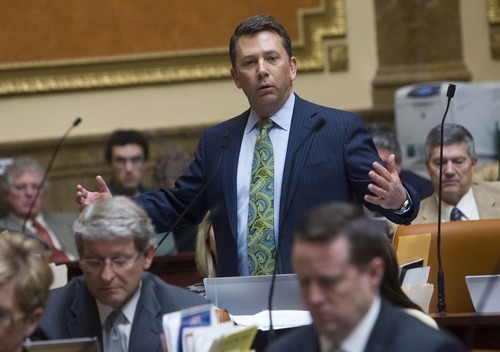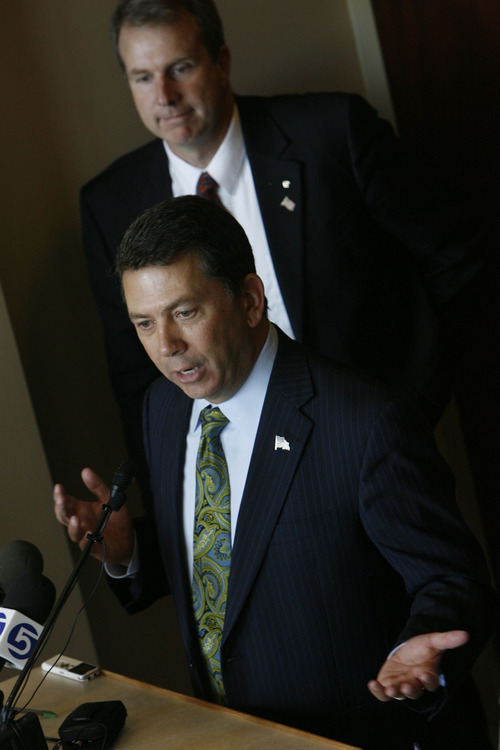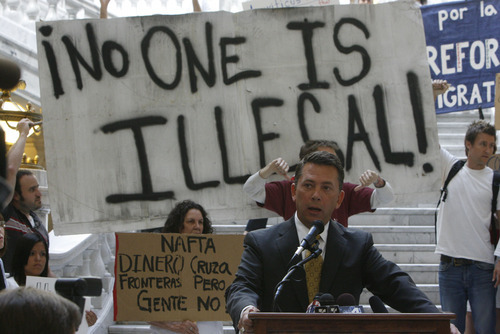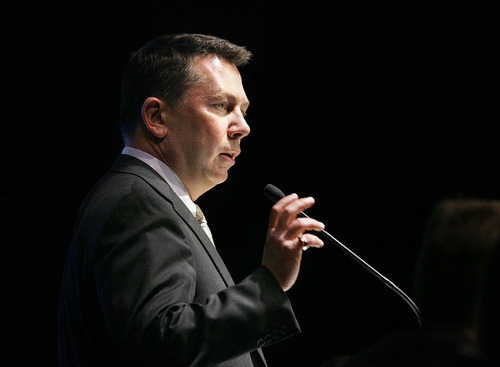This is an archived article that was published on sltrib.com in 2012, and information in the article may be outdated. It is provided only for personal research purposes and may not be reprinted.
The changing heart of Stephen Sandstrom hinged on meeting a teenager named Sara.
It was the summer of 2011 and the Orem Republican lawmaker had just finished a panel discussion on illegal immigration at a West Valley City school auditorium, where he was defending a hard-line approach.
Sandstrom, who tended to stay late after public events to meet with people one on one, was approached afterward by a 19-year-old with long, dark hair. She began to tell him her story. He later said he couldn't stop thinking about her.
Sara told him she was brought from Mexico without immigration papers at age 3. From the moment she was old enough, she attended school in Utah and graduated from high school with a high grade point average. And then, after being handed a diploma, she stared straight into a dead-end future.
No documents. No Social Security number. Almost no opportunity.
"I was just panicked inside for her. Can you imagine? I put myself in her shoes and how horrible that feeling would be," Sandstrom said. "I remember she told me how she used to place her hand over her heart saying the Pledge of Allegiance. 'I love America. I am an American,' she told me. I thought about it and, for all intents and purposes, she is."
So the man who had cozied up to anti-illegal-immigration firebrand Russell Pearce, blasted The Utah Compact's push for a compassionate approach as disingenuous and had become Utah's face for a strict enforcement-only approach suddenly found himself looking into the eyes of despair.
And Sandstrom blinked.
—
Hard-line • In March 2010, Sandstrom appeared at Phoenix Rising — an anti-illegal-immigration rally in the Arizona capital that featured a host of high-profile immigration restrictionists, including Maricopa County Sheriff Joe Arpaio, former Colorado Rep. Tom Tancredo and the keynote speaker, Pearce.
When Sandstrom spoke that day, he gave thanks to "my good friend Senator Pearce" and then told the crowd that SB1070 was coming to Utah — calling it the "exact" same bill.
"Arizona, you have inspired us," he said. "You have woken up the people of Utah."
He ended his speech with his voice rising above a crescendo of approving cheers. "We have room but for one loyalty, and that's to the American people and the citizens of the United States of America — not to illegal aliens."
Sandstrom also met with an attorney representing the legal arm of the Federation for American Immigration Reform — a nonprofit organization that's been in a fight for years with the Southern Poverty Law Center after being labeled a "hate group" and counters those claims by saying it's a smear campaign.
Michael Clara, who became chairman of the Utah Republican Hispanic Assembly, saw all of these pieces moving Utah into the same camp as Arizona that summer and feared the worst for the upcoming immigration fight.
"I told [Sandstrom] he was a bigot," Clara said.
So did others. Sandstrom launched his bill publicly at the Utah Capitol in August of that year, but failed to account for a horde of protesters who overwhelmed him with signs saying he was racist.
Arturo Morales-Llan, a Mexican immigrant from Orem who was watching news accounts of Sandstrom encircled and alone amid the jeers, wrote an email to his state senator, Republican Margaret Dayton. She forwarded it to Sandstrom.
"My respect goes out to him for doing the right thing in front of a very hostile crowd," Morales-Llan wrote at the time. "It took an incredible amount of guts, courage and valor to do what he did, and I applaud his actions."
Morales-Llan said the lawmaker called him and said Sandstrom had cried. Morales-Llan vowed he'd back Sandstrom in his fight against illegal immigration and soon appeared at a series of panels, debates and hearings in support of the lawmaker.
He also joined Sandstrom in his ire over The Utah Compact, a document signed in November 2010 by politicians and religious and business leaders seeking to tone down the heated rhetoric created by SB1070. When the LDS Church weighed in with a statement of support on the compact, Sandstrom publicly charged the statement was aimed directly at him and called its compassionate approach deceptive because it didn't use the term "illegal immigration."
When Gov. Gary Herbert signed a series of immigration reform bills in March 2011 — including a controversial guest-worker law that sought to provide legal status for those already in the state unlawfully — Sandstrom refused to attend the signing ceremony that included his own enforcement-only measure, HB497.
There was a move to draft Sandstrom, hailed by anti-illegal-immigration advocates, to run for governor and repeal the guest-worker law.
That's when Morales-Llan thought he picked up on a subtle change.
"I noticed he kind of backed away," Morales-Llan said. "Shortly after that, he attempted to climb Mount Everest and went missing in action for all of the repeal effort."
That July, when Morales-Llan and other opponents of the guest-worker law appeared at the Capitol and activist Brandon Beckham labeled lawmakers "traitors" for passing it, Sandstrom never showed up, even after Morales-Llan said he told them he would be there. Morales-Llan said the "backtracking caused him to lose respect among the delegates."
"I guess his heart wasn't in it," he said.
But Ron Mortensen, one of the state's lead figures on opposing illegal immigration, said the change may not have been that much of a change at all.
Instead, he said, Sandstrom was simply a busy guy.
"He had a life to live," Mortensen said. "I never looked at it as he was letting us down. Immigration wasn't his life."
—
Overly harsh • Sandstrom said he looked back at his ideas on immigration and began to believe the sole focus on enforcement was poisoning the debate. His HB497 law is tied up in court, awaiting the U.S. Supreme Court's decision on SB1070. He still believes in it.
He didn't show up to the hearing in February, though he did offer support for the law in interviews. Sandstrom, however, had already gone on record a couple of months earlier when Alabama's enforcement-only law took effect and ripped it for being "overly harsh." Not long after that, when Pearce was facing his recall election, Sandstrom took the then-Senate president to task, saying, "We have to remember we are affecting human beings, and I think that's where Russell got off track."
Later, when Sandstrom and Carl Wimmer — who were both friends with Pearce — ran for Utah's 4th Congressional seat, Pearce endorsed Wimmer.
Sandstrom said his support for HB497 reflects just one aspect of his view on tackling illegal immigration. But he's become increasingly focused on addressing the estimated 110,000 people living in Utah and approximately 11 million living in the United States without documents.
And, again, it came back to Sara.
"I think for people who are on the other side — strict enforcement and forcing them to go home on their own when they were brought here when they were 3, that is the wrong attitude to have," Sandstrom said. "I think [Sara] was one of the first who told me a story that really pulled at my heartstrings. It made me realize at that point what people are facing. It was really eye-opening."
He wishes now he had gotten contact information for Sara. And immigration activists said they didn't have any leads on how to find her.
Sandstrom said he supports a path for children in the country who don't have proper documentation to gain legal status. He still backs Mitt Romney, the presumptive GOP nominee for president, but diverges sharply on his concept of self-deportation. Sandstrom said that notion wasn't "practical," and he was quoted by the liberal website ThinkProgress as saying there needed to be a way for people to "square themselves" with the law.
"We need to look at a way to help the people that have not been criminals in this country or the people that were brought here at a young age to remain," he said.
This was shocking to Utah Rep. Curt Oda, R-Clearfield, who was one of the strongest advocates of enforcement-only and self-deportation. Oda said Sandstrom clearly has moved from where he stood two years ago.
"Part of it might've been his run for Congress to try and attract the Hispanic vote," Oda said. "But now having already changed his stance, how can he go back?"
The short answer is he doesn't want to.
—
Parting ways • The 48-year-old Sandstrom lost decisively at the state Republican convention in April and quickly endorsed Mia Love over friend Wimmer as the 4th District nominee — though Wimmer wrote a scathing screed against Sandstrom that seemed to cast that relationship in doubt.
Wimmer — along with Republican Reps. Ken Sumsion and Chris Herrod — was a founding member of the Patrick Henry Caucus, and Sandstrom was one of its active members. Sandstrom recently parted ways with the caucus, which, among other things, supported a tough enforcement-only approach to immigration.
Wimmer said he won't comment on Sandstrom other than to say, "I wish him the best."
Lee Rech, who worked with Sandstrom on his campaign, said the shift to a softer stance on immigration reform isn't surprising to her.
"I know he's a compassionate guy. Maybe he was caught up in the furor of the movement, and it was a more staunch stance then," Rech said. She believes he sees a need to give a fair shake to people who were brought into the country illegally as kids.
Clara said Sandstrom asked him to review campaign materials related to immigration, and he was surprised to see the word "compassion" used several times in the drafts.
"I actually told him to take out a few of the 'compassions,' " Clara said. "I also said that if I lived in the [4th Congressional District], I'd have supported him."
Sandstrom, who for the first time in 19 years doesn't hold an elected office, said he would continue to work at his architectural firm and "try to build bridges" around the issue of immigration reform.
He said he's scheduled to speak at a Human Rights Commission group in August. He's also planning to sign The Utah Compact.
"I was actually thinking about doing that earlier," he said. "I'm just not sure what the appropriate timing will be."
He also has a message for Sara.
"I honestly hope she feels optimistic," he said. "I think there is hope and that attitudes are changing."
dmontero@sltrib.comTwitter: @davemontero —
The Utah Compact
• Seeks federal solutions and urges state leaders to adopt reasonable policies addressing immigrants in Utah
• Says local police should focus on criminals, not civil violations of federal code
• Opposes policies that separate families
• Affirms Utah respects economic contributions of immigrants
• Asks for a humane approach to the issue —
Sandstrom's HB497
Originally modeled after Arizona's SB1070 law, the law requires local police to check the legal status of suspects in a felony or Class A misdemeanor arrest. It provides local police the discretion to check for legal status on Class B or C misdemeanors. The law is on hold pending the outcome of a lawsuit.


